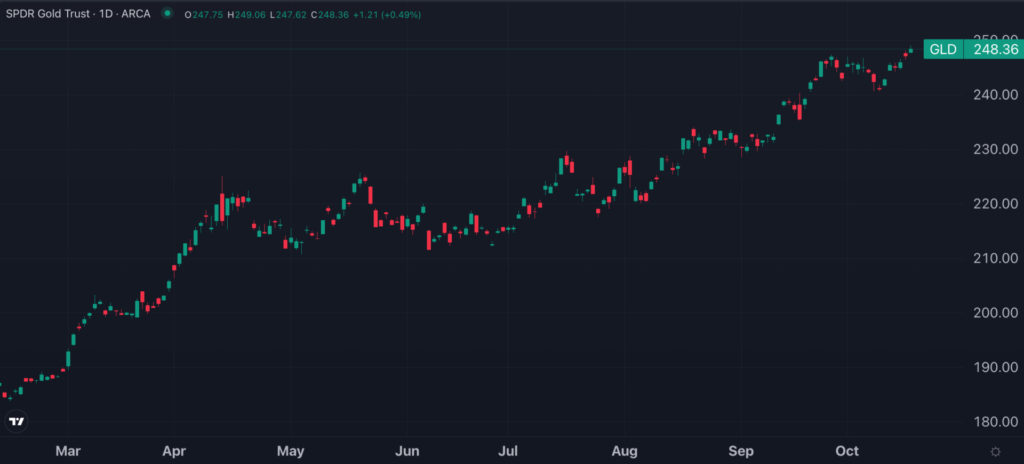Gold Could Reach $3,000 By 2025, Bank Of America Analyst Says: 'Ultimate Perceived Safe Haven'
Bank of America released a bullish note on gold Thursday, just as the precious metal reached new record highs at $2,696 per ounce (oz).
Gold remains “the ultimate perceived safe haven asset” in today's macroeconomic environment, according to Bank of America’s commodity analyst Michael Widmer, amid rising concerns over U.S. fiscal policies and their potential impact on Treasury yields.
Gold Trends Higher As Fed Shifts Policy
Despite nominal U.S. Treasury yields trending upward, gold prices, as tracked by the SPDR Gold Trust (NYSE:GLD), have been climbing in recent weeks, supported by various factors.
Widmer explained that a key driver behind this surge is the rising inflation expectations paired with the Federal Reserve's policy shifts.
Rate cuts triggered a surge in inflation expectations, which in turn kept downward pressure on real yields, increasing gold’s appeal as an inflation hedge.
“Accompanying the first Fed’s 50bp rate cut, inflation expectations have risen, meaning that 10-year real yields, usually the most significant gold price driver, kept declining through September,” Widmer said.
Gold Hits All-Time Highs On Oct. 17

U.S. Fiscal Policy Boosts Bullish Gold Outlook
A key factor bolstering Bank of America's bullish stance on gold is the U.S.’s fiscal trajectory.
Rising interest rates have significantly increased the federal government’s debt servicing costs, triggering concerns about fiscal sustainability. According to government projections, the national debt is projected to reach a new record high as a share of the U.S. economy within the next three years.
Widmer highlighted that “whoever wins the 2024 presidential election will face an unprecedented fiscal situation upon taking office. Neither Kamala Harris nor Donald Trump seems to prioritize fiscal consolidation.”
The CRFB report details that Vice President Harris's proposed policies could increase the national debt by $3.5 trillion through 2035, while former President Trump's platform might raise it by as much as $7.5 trillion. "
The large and growing national debt threatens to “to slow economic growth, boost interest rates and payments, weaken national security, constrain policy choices, and raise the risk of an eventual fiscal crisis.”
Global Trends Also Favor Gold
According to Widmer, fiscal expansion policies are gaining traction across advanced economies, contributing to gold’s global appeal. The International Monetary Fund (IMF) estimates that new fiscal spending related to climate adaptation, demographic shifts, and rising defense costs could amount to 7-8% of global GDP annually by 2030.
This massive spending will likely force governments to issue more debt, and as volatility in the bond markets rises, gold will emerge as a refuge for investors, Widmer explained.
Central banks are also anticipated to increase their gold holdings as part of currency reserve diversification. The share of global central bank reserves held in gold has climbed to 10%, up from just 3% a decade ago.
Outlook for Gold: $3,000/oz By 2025
Bank of America sees gold reaching the $3,000/oz mark by the first half of 2025. The combination of macroeconomic uncertainty, rising debt levels, and central bank buying makes gold the “last safe haven asset standing.”
Read Next:
- Strong September Retail Sales Put Fed’s Next Move In Doubt: Interest Rate Cuts Are ‘Not A Slam Dunk’
Photo: Shutterstock
 Index Options
Index Options CME Group
CME Group Nasdaq
Nasdaq Cboe
Cboe TradingView
TradingView Wall Street Journal
Wall Street Journal